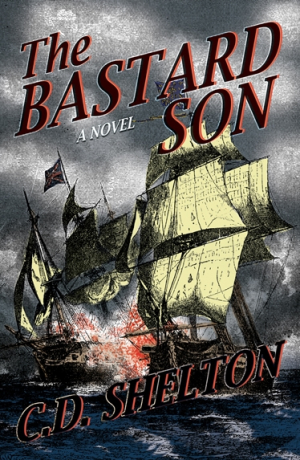The Bastard Son
This tale of honor, bravery, and accomplishment interweaves real-life history to bolster the adventure of the story.
In his new novel, The Bastard Son, C. D. Shelton presents an epic saga of nobility, heroism, and adventure on sea and land in sixteenth-century England that is interwoven with a keen knowledge of the history and culture of the era.
Jonathan Winter, born in ignominy, overcomes his shameful origins with bravery and honor to rise to prominence in the kingdom. Born out of wedlock to a baron and assuming all title and wealth will be passed on to his legitimate half-brother, Winter sets his eyes on the Royal Navy with the intent of making a name for himself and winning the right to ask for the hand of his love, Lady Lydia, in marriage.
Winter quickly wins the favor of King Henry VIII with an act of valor in a lost battle with the French and his career is fast-tracked. He is given missions beyond his rank and experience, such as seizing French gold and rescuing captured British soldiers, and he exhibits his prowess while vanquishing his arch-nemesis, Commander Chevalier D’Aux, at every turn. Eventually, Winter wins the honor he wasn’t born into, as well as the approval of his future father-in-law: “We make much of pedigrees in royal circles. I’ve known many sons born with a royal pedigree as long as your arm. All legitimate sons who were a mere fraction of the man you’ve become.”
In relating this tale of honor, bravery, and accomplishment in a bygone era, Shelton, a veteran writer of several novels, exhibits an intimate knowledge of the history and culture of mid-sixteenth-century Great Britain. Real events of the day, such as the death of Henry VIII, the rise of King Edward IV, and the Auld Alliance between Scotland and France, are integral to the plot. The author also demonstrates a keen understanding of military and sea-faring lore: “The Mary Rose was well into her turn when a strong gust of wind struck the vessel on the starboard side, where the gun ports were open. Water began to rush in on the main deck, and the ship began to flounder.”
The factual, historical, and cultural tidbits gleaned from reading The Bastard Son are at least as satisfying as the fictional tale itself, which at times falls flat; Shelton seems to be struggling throughout to imbue his plot elements and characterizations with the same enthusiasm he has so clearly invested in his historical research. Too often, the characters lapse into a pattern of talking about what they are going to do, doing it, and then talking about what they’ve done, with little story arch or foreshadowing.
In The Bastard Son, Shelton provides a glimpse into an age of sea-faring exploits with a tale notable for a wealth of historical detail.
Reviewed by
Barbara Bamberger Scott
Disclosure: This article is not an endorsement, but a review. The publisher of this book provided free copies of the book and paid a small fee to have their book reviewed by a professional reviewer. Foreword Reviews and Clarion Reviews make no guarantee that the publisher will receive a positive review. Foreword Magazine, Inc. is disclosing this in accordance with the Federal Trade Commission’s 16 CFR, Part 255.

